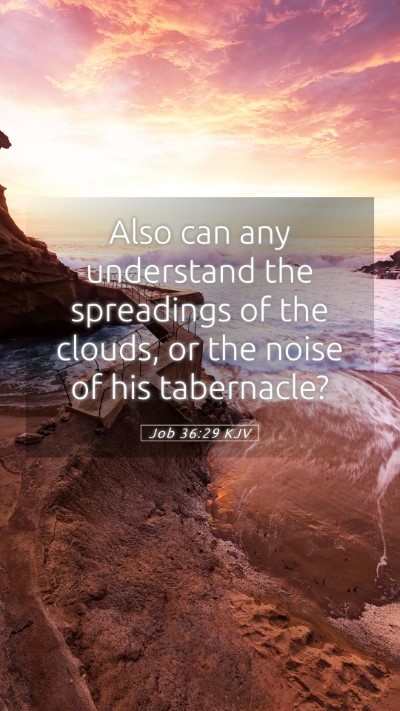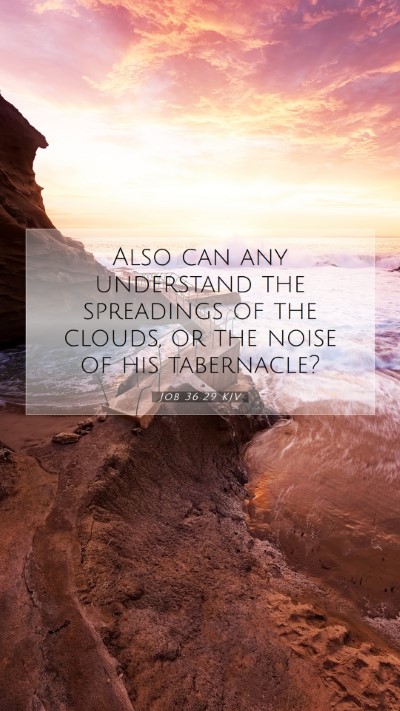Understanding Job 36:29 - A Comprehensive Commentary
The verse Job 36:29 states: "Also can any understand the spreading of the clouds, or the noise of his tabernacle?" This verse invites readers to contemplate the greatness of God and His creation, particularly in relation to the natural phenomena of storms and cloud formations. Through insights extracted from public domain commentaries, we can uncover the profound meanings behind this scripture.
Context of the Verse
To fully grasp the significance of Job 36:29, it is essential to analyze its context. Job, a man of great suffering, finds himself amidst a discourse on God's power and justice. Elihu, a younger character in the text, addresses the mysteries of God's actions and His dominion over the universe. This verse emphasizes God's incomprehensible might and the limitations of human understanding when faced with divine phenomena.
Key Insights from Commentaries
- Matthew Henry: He reflects on the imagery of clouds and storms, indicating that they are manifestations of God's control over nature. Henry suggests that God’s powers are beyond human comprehension, and the phenomena we observe in the world serve as reminders of His majesty.
- Albert Barnes: Barnes highlights the rhetorical nature of the verse. Questions such as "Can any understand?" emphasize humanity's inability to grasp the full scope of divine action. He argues that it illustrates the mysteries of God's creation and the authority He wields over the elements.
- Adam Clarke: Clarke emphasizes the beauty of the natural world and how it reflects God’s glory. He notes how storms, while fearsome, are under God's sovereignty, and they serve a purpose. This understanding encourages believers to trust in God's plan even when faced with chaotic elements of nature.
Biblical Exegesis and Theological Implications
This verse serves as both a theological reflection and a call to humility. It beckons believers to recognize their limitations in understanding God's various works in the world. The imagery of clouds and the metaphorical “noise” of the tabernacle can be taken to signify the wondrous ways in which God reveals Himself through creation.
Applications to Daily Life
Understanding Job 36:29 can offer numerous applications for daily life:
- Trust in God’s Sovereignty: Acknowledge that, while we may not comprehend every circumstance we encounter, God orchestrates all events according to His divine wisdom.
- Humility in Understanding: Recognize the limitations of human insight, fostering a spirit of humility when faced with difficult situations or when seeking to understand God’s purpose.
- Awareness of Creation: Cultivating an appreciation for the natural world can deepen one's faith and acknowledge the majesty of God's handiwork.
Cross References
This verse relates to other Biblical passages that highlight the power and glory of God:
- Psalms 104:3-4: Discusses God’s portrayal in nature, emphasizing His control over creation.
- Isaiah 40:22: Speaks to God sitting above the circle of the earth, highlighting His sovereignty.
- Matthew 8:27: When Jesus calms the storm, underscoring His authority over nature.
Conclusion
In summary, Job 36:29 invites believers to reflect on the significant themes of God's sovereignty, the mystery of creation, and the importance of trust and humility. As part of your Bible study resources, this verse serves as a profound reminder to embrace the complexities of faith while recognizing that not all can be understood through human reasoning. Engaging with this scripture can lead to deeper Bible verse explanations and a greater appreciation for the divine.


